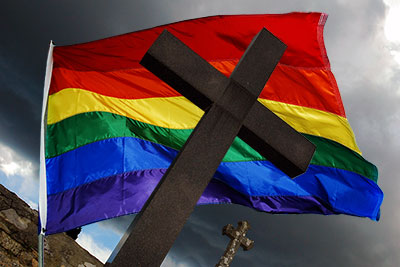Churches are fuelling suicide among gays and lesbians
 In the wake of the Grace Bible Church furore in South Africa, a new UK report has found that church teaching on same-sex relationships is making lesbian, gay and bisexual (LGB) people more likely to contemplate suicide.
In the wake of the Grace Bible Church furore in South Africa, a new UK report has found that church teaching on same-sex relationships is making lesbian, gay and bisexual (LGB) people more likely to contemplate suicide.
The In the Name of Love: The Church, exclusion and LGB mental health issues report by the Oasis Foundation, has unveiled ‘watertight’ research that demonstrates that homosexual and bisexual people are up to 12 times more likely to experience mental health difficulties.
It also backs the continuingly growing consensus that this is caused by societal discrimination that says – both explicitly and implicitly – that heterosexuality is superior to homosexuality.
The study demonstrates ‘beyond reasonable doubt’ that it is church goers and Christian leaders who are responsible for fuelling negative messages about same-sex relationships in society, the media and political debate.
While previous studies have shown the damage done to LGB people within Christian denominations, this report is the first study that seems to justify the long-held assumption that church practises and teachings are seriously damaging the mental health of LGB people outside the Church, often with life-threatening consequences.
A staggering 44% of LGB youth claim to have considered suicide and over half (52%) have self-harmed at some point. The new report states, however, that there is nothing intrinsic about being homosexual or bisexual that makes people susceptible to poor mental health. Instead, through surveying a range of studies from Western Europe, the report identified two major categories of causes:
- 1. Direct homophobia and discrimination – whereby LGB people directly experience a lack of access to communities, bullying or inferior treatment because of their sexuality or membership of a same-sex relationship.
- 2. Societal inferiority – whereby LGB people feel second class because of both explicit and implicit references in families, communities, the media and society that to be homosexual or bisexual is an inferior status to heterosexuality.
By analysing the practises of the major UK denominations, the study finds that – with the exception of the United Reformed Church – all the church groups practise discrimination of LGB people in some form, making churches some of the biggest organisational discriminators.
The analysis also establishes that church goers are the biggest source of negative attitudes toward same-sex relationships in the media, society and political debate:
- While all groups are growing more liberal to same-sex relationships, religious people are doing so at a much slower rate. In 1983, Anglicans were 1.2 times more likely than the non-religious to think homosexuality was wrong; now they are 2.6 times more likely.
- While only 37% of the general population opposed same-sex marriage in 2013, according to research by Oasis in 2015, opposition among church-goers was 49%
- Of the signatories listed on the website of the Coalition for Marriage (the campaign against same-sex marriage), 74% can be publicly identified as Christian.
- Of the MPs who voted against the introduction of same-sex marriage in the UK in 2013, 54% self-identify as Christian and many others may privately consider themselves people of faith.
- An analysis of 100 national media articles on the topic of ‘same-sex marriage’ found that 47% contained a negative comment, and of those negative comments 91% are from a Christian leader or commentator or politician who can be identified as Christian.
“It is no secret that the negative stance taken by the Church, and so many individual local churches, has a hugely distressing impact on large numbers of LGB people and leaves countless numbers of them living lives of forced secrecy and dishonesty,” said Rev Steve Chalke, Founder of Oasis.
“Tragically, it is also common knowledge that the resultant anguish and distress often leads to spiritual, mental and physical harm, and in the worst of cases to people making the desperate decision to take their own life.
“Too often however, these powerful testimonies are dismissed by those that don’t want to hear them – those who are not yet ready to face up to the scale of the damage that we collectively have unintentionally caused,” added Chalke.
Leave a Reply